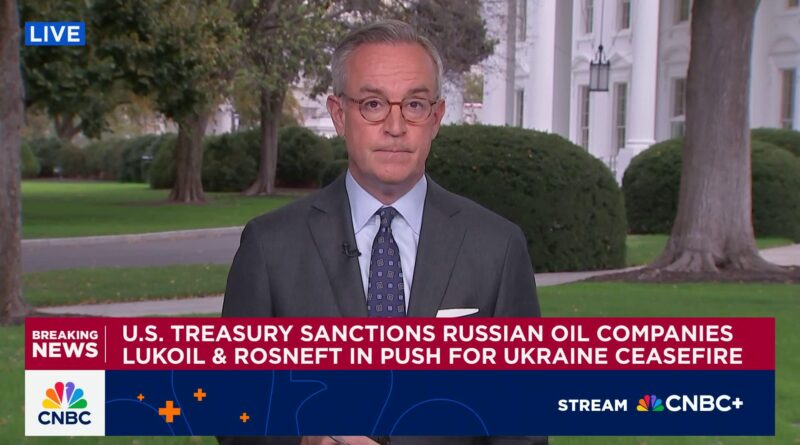Stony silence from Moscow after Trump turns on Russia, says talks with Putin ‘don’t go anywhere’
U.S. President Donald Trump speaks with Russian President Vladimir Putin, as they meet to negotiate for an end to the war in Ukraine, at Joint Base Elmendorf-Richardson in Anchorage, Alaska, U.S., August 15, 2025.
Kevin Lamarque | Reuters
There was a stony silence from Moscow a day after the U.S. President Donald Trump criticized Russian President Vladimir Putin and slapped punishing sanctions on Russia’s two largest oil companies.
Just days after a “very productive” phone call between the two leaders — in which they agreed to meet in Hungary and after which the U.S. president appeared to take Russia’s side regarding a possible peace deal with Ukraine — Trump changed tack on Wednesday, voicing his frustration with Moscow.
“We canceled the meeting with President Putin. It just, it didn’t feel right to meet. It didn’t feel like we were going to get to the place we have to get. So I canceled it, but we’ll do it in the future,” Trump said Wednesday.
“Every time I speak to Vladimir, I have good conversations and then they don’t go anywhere. They just don’t go anywhere,” Trump added, flanked by NATO Secretary-General Mark Rutte, with whom he had discussed peace proposals for Ukraine.

Asked why he had chosen to impose a package of sanctions on oil majors Lukoil and Rosneft at that moment, Trump said, “I just felt it was time, we’ve waited a long time.”
Stony silence
Trump’s comments on Putin were notably widely absent from pro-Kremlin state media outlets such as TASS, Radio Sputnik and RIA Novosti‘s news coverage on Thursday, with barely a mention of the criticism or canceled meeting.
Just a day before, Russian state media — essentially, the mouthpiece of the Kremlin — had been bullish that planned talks between Putin and Trump that were due to be held in Hungary, but which had been postponed by the White House, would go ahead.
The Kremlin and various senior Russian officials had blamed “fake news” for undermining the Trump-Putin summit but the White House appeared to have put the talks on hold after Russia reiterated its position that it did not support an immediate ceasefire in Ukraine.
Kremlin spokesman Dmitry Peskov attends a meeting of Russia’s President Vladimir Putin with Laos’ President Thongloun Sisoulith in Moscow, Russia, May 9, 2024.
Alexei Maishev | Via Reuters
Putin’s Press Secretary Dmitry Peskov has not yet publicly commented on the canceled meeting, the sanctions, or the prospect of Trump-Putin talks being held in future. CNBC has contacted the Kremlin for comment.
Russia’s foreign ministry spokesperson Maria Zakharova said Thursday that that the ministry was ready to “continue contacts” with the U.S. State Department but said its goals in Ukraine “remain unchanged,” in comments translated by NBC News. The latest sanctions on Rosneft and Lukoil were counterproductive, she added, to finding a peaceful solution to the war.
Former Russian President Dmitry Medvedev, a well-known anti-West hawk, slammed Trump’s cancellation of the Budapest summit, commenting on Telegram Thursday that the “U.S. is our adversary and their talkative ‘peacekeeper’ [Trump] has now fully embarked on the warpath against Russia.”
“Now Trump has fully aligned himself with an insane Europe,” Medvedev posted, in comments translated by Google.
Sanctions pressure
The sanctions on Lukoil and Rosneft, and dozens of subsidiaries, are aimed at pressuring Moscow, which has funded its three and a half year war in Ukraine using revenues derived from global oil sales, to agree to a ceasefire, the U.S. Treasury said.
The Treasury Department said the new sanctions will harm the Kremlin’s ability to raise revenue to fund its war against Ukraine.
Treasury Secretary Scott Bessent said his department “is prepared to take further action if necessary to support President Trump’s effort to end yet another war,” Bessent said. “We encourage our allies to join us in and adhere to these sanctions.”

The EU on Thursday also launched a fresh rounds of sanctions against Russia. The package of measures, which member states approved on Wednesday evening, includes a ban on Russian liquefied natural gas (LNG) imports.
Kaja Kallas, the EU’s high representative for foreign affairs and security policy, and vice president of the European Commission, told CNBC Thursday that the new sanctions are “a good signal of strength that the U.S. is putting sanctions on big Russian oil companies. It’s really depriving Russia of the means to fund this war. It’s necessary to end this war.”
Source – CNBC



